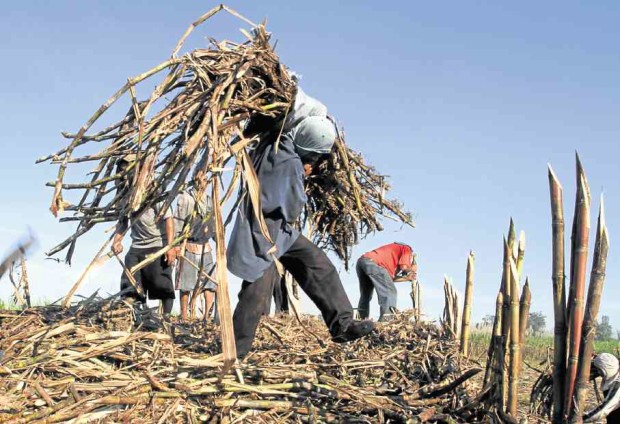
In Tarlac province, sugarcane growers in Hacienda Luisita have hired “sacada” (surgarcane plantation workers) from Mindanao as locals turn down offers to work the fields. —GRIG C. MONTEGRANDE
The Department of Labor and Employment (Dole) is looking into the hiring of up to a thousand sugar workers from Mindanao to work during the harvest season in Hacienda Luisita in Tarlac province.
Labor Undersecretary Joel Maglunsod ordered an investigation after learning that the hiring did not secure clearance from the Dole in Central Luzon region.
The Unyon ng Manggagawa sa Agrikultura (UMA) claimed it “rescued” 43 of these workers from Bukidnon, Cotabato and Davao provinces last month at the request of the Organisasyon sa Yanong Obrerong Nagkahiusa (Ogyon), an affiliate of UMA in Bukidnon.
Dole, the Department of Social Welfare and Development (DSWD) and the Department of Agrarian Reform (DAR) assisted the workers, four of whom were minors while 24 were members of the Manobo tribe.
Danilo Ramos, UMA secretary general, said Greenhand Labor Service Cooperative recruited the workers for Agrikulto Inc., which, he claimed, was bought by the Central Azucarera de Tarlac. They were recruited to work from November 2016 to February 2017.
Hacienda Luisita is owned by relatives of former President Benigno Aquino III.
But Jose Cojuangco Jr., former Tarlac representative and brother of the late President Corazon Aquino, said he has no ties to Agrikulto.
“I don’t know what they are talking about,” he said in a text message.
Complaint
On Wednesday, UMA and three of the workers filed a labor complaint against Greenhand, individual recruiters in Mindanao and Agrikulto in the National Labor Relations Commission.
“This despicable practice of exploiting ‘sacada’ (sugarcane plantation workers) for the [harvest] season has long been uninterrupted in Hacienda Luisita,” Ramos said.
Because of a Supreme Court order in 2012, the DAR gave each of the 6,300 workers in Hacienda Luisita a 6,600-square-meter land, which was either rented out for lack of farming capital or illegally sold.
Ramos said the workers were promised a package consisting of a daily wage of P450 plus benefits, meals, including provision for board and lodging, and travel to and from Luisita. They were also promised P7,000 cash advance in three tranches.
“Instead of the P450 daily wage, they were paid a group rate of P220 per ton of sugarcane cut and hauled into trucks,” Ramos said.
A sugar planter working in a section of Hacienda Luisita in Concepcion town in Tarlac said UMA had the wrong figures.
“The sacada number 100 to 200, not 1,000,” said the planter, who asked not to be named for security reasons.
Those who rented agrarian reform lands distributed by the government to Luisita farm workers resorted to employing sacada after few farmers agreed to cut cane, he said.
He said he pays sacada a group rate of P250 per ton. A group of 10 workers can cut 18 tons of sugarcane a day for P4,500. That means each worker can earn P450 after 10 hours, he said.
In a press conference in Metro Manila on Thursday, the workers spoke of the deceit and hardships they experienced since November, during the annual sugar harvest and milling season.
Mario Memper Jr. from Bukidnon said Billy Baitus, who managed Greenhand, spoke with the datu (tribal chieftains), asking for workers. In exchange, Baitus reportedly promised to help the tribes in the fight for their ancestral lands.
‘Like Bilibid’
“We were also promised accommodation in a hotel, near a hospital for our medical needs,” he said. “But when we got there, it was like Bilibid, a prison.”
Instead of the promised wages and accommodation, the workers were reportedly paid as little as P9.50 daily. They were also forced to live in cramped bunkhouses in Barangay Mapalacsiao which were locked at night to prevent them from escaping.
Memper also noted that they were told the job was part of a supposed “livelihood project” under President Duterte.
There were weeks when they were not given anything to eat, said another worker, Rosalito Bravo, but were still forced to work from 4 a.m. to 5 p.m. to meet their quota.